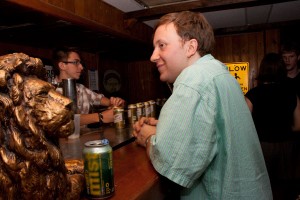While college students line the pathway into a frat house ready to drink and party, one student is having quite the opposite sober experience.
Zachary Schwake is president of Cornell University fraternity Tau Kappa Epsilon. He knows what it’s like to ditch drinking for a night to watch his house get terrorized by a public party. As president, his duty is to serve as the sober monitor at “open parties,” or non-catered invite events that are open to non-Greeks. He said sober monitors’ primary concern is the safety of their guests.

“They remain sober, and they patrol the area and make sure everyone is at a safe level, and if there’s any issues with people being overly intoxicated, they come to me or the social chair,” he said. “If anyone’s giving us trouble, we just throw them out.”
As guests started to arrive around 10 p.m. Friday, Schwake made his way around the house, checking that TKE brothers were monitoring key locations: the entrance, the exit, the downstairs bar and the upstairs bar.
By 10:45 p.m., the house was half-full with people clad in tribal costumes and war paint to accompany the party’s Amazon and El Dorado theme. Sober monitor Michael Knapp cracked open beers and handed them to guests, one right after the other.
Knapp leaned over the bar and pointed at the dance floor, where clusters of people were drinking and socializing.
“It will pick up pretty soon,” he said.
Right on cue the music volume increased at 11 p.m., and the basement was suddenly packed with people wall to wall.
Once the house became crowded, Schwake walked outside and stood near the entrance by the monitors checking student IDs.
“This is the longest line we’ve ever had,” he said
One student, who was fed up with waiting, approached the president and begged for her group to be let in.
“That line is not going anywhere, and you know it,” she complained. “We’ve even got five girls to one guy!”
“I appreciate the ratio argument, but we’ve got to let in the amount of people we let out,” Schwake said calmly and redirected her back to the line.
For Schwake, hosting open parties is not a good experience, especially because many don’t understand the rules that allow the fraternities to host big parties in the first place. His fraternity must abide by Interfraternity Council standards: There can be no common source of alcohol such as a keg, there must be one designated sober monitor for every 20 people in the house, and once the house reaches capacity of 250 people, they can only let guests in if others exit.
He said, luckily, the IFC allows only three non-catered invite events per semester, which the frat only hosts for publicity.
“Hosting them is not fun, but these are our main source of recruitment and sorority relations and just getting ourselves known on campus,” he said. “We have to do it to maintain that relationship.”
Outside the TKE house, about half of the people in line already looked intoxicated. One guy broke free from his friends and jumped on a car in the parking lot.
“This party sucks,” he screamed and told everyone outside to come to his party instead.
Schwake and another sober monitor ran to order the guy off the car, while Nicholas Callioras, the first and only Ithaca College student in the frat, shoved another drunken guy out of the door and to the end of the parking lot for arguing with other monitors.
The president shook his head.
“They come here and use our house and drink our beer, and they’re still disrespectful,” he said.
Callioras said without sober monitors, parties would get out of control.
“If there were ever a disaster like a fire or something, there would be no direction from somebody who had a sound mind,” he said.
After campus police arrived stating they had a noise complaint and would shut the party down if the noise continued, Schwake said the night had reached the point where he had to be on his game.
“[If the cops were to come in] and any
under-agers were drinking alcohol, that’s when they put us on probation,” he said.
That would mean no more parties at the TKE house for six, eight or 10 academic weeks, which would carry over to the fall 2010 semester.
Schwake said he wishes more people would associate the Greek system with things other than partying. The frat’s neighbors include Cornell professors, so the frat tries to be respectful and keep the noise to a minimum.
Schwake said open parties are only a speck in the range of events hosted by the fraternity.
“My weekends are not impacted too heavily [from sober monitoring] since we have only three non-catered invite events a semester,” he said. “So most of the time is spent at smaller events that we can relax at.”
Once the night reached 1 a.m., the music was sharply cut off and the lights were turned on, a cue for partiers to disperse. They did, and headed up the basement stairs and out the front door like cattle.
While Schwake generally dislikes sober monitoring, he said it is interesting to be the sober person who witnesses the ridiculous things drunken people do.
“As the night goes on, you can see hour by hour things getting a little shakier,” he said. “People do change a lot when they drink. It’s definitely entertaining. It makes up for not drinking sometimes.”




